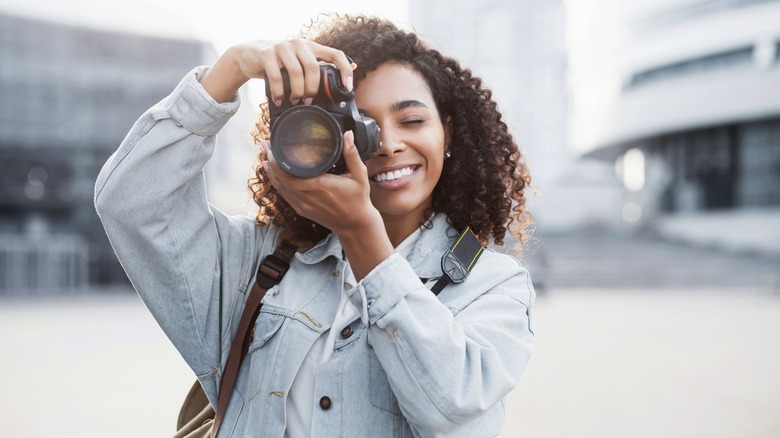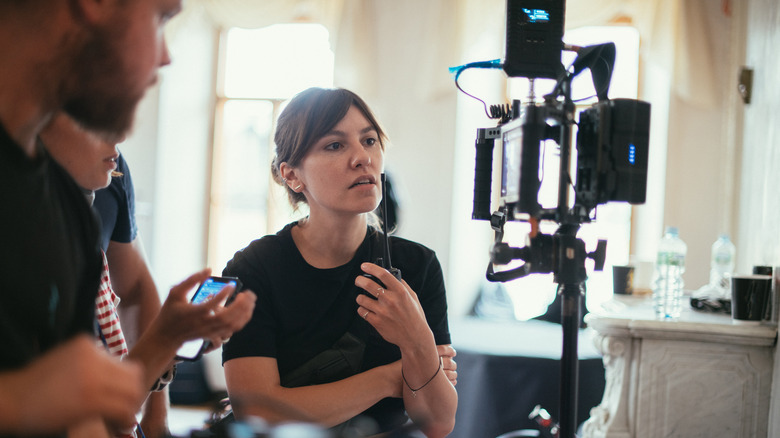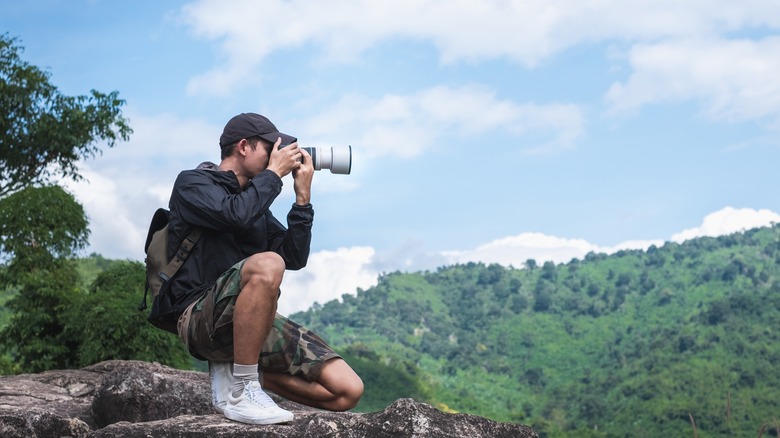Here's How To Start A Career As A Photographer
Do you enjoy taking photos and turning them into works of art? Are you familiar with Adobe Photoshop, Corel, Canva, and other photo editing apps? In that case, you could leverage your skills to become a professional photographer. Popular magazines like Elle, Vogue, National Geographic, and Harper's accept photography submissions from talented professionals, and the pay is quite good. Plus, you can specialize in one or more areas, such as fashion photography, sports photography, or photojournalism, notes The Art Institutes.
First, make sure you know what to expect in this role. Professional photographers do more than just take pictures and edit them on a computer. They also reach out to potential clients, conduct research for photoshoots, and spend hours on post-processing. Depending on the job, they may also work closely with retail or marketing teams, graphic designers, writers, and other professionals. Having technical know-how is just as important, explains Digital Photography School. Take the time to learn about patterns and repetition, framing, depth of field, the rule of thirds, and other photography techniques.
This career path doesn't require a college degree, but you may complete training or apply for internships. Also, be prepared to experiment with different types of photography and practice your skills. If you want to go freelance, you'll need to learn a thing or two about marketing and building your business from the ground up.
Get the right education to become a photographer
Professional photographers have an eye for detail and specific skills, such as creativity and artistic abilities. Their work also requires a strong understanding of the different types of light, camera angles, and compositional techniques. For example, you can take low-angle shots to draw attention to the subject or capture a unique perspective. This can also be achieved through the use of negative space, leading lines, or framing.
As a novice photographer, you may not be aware of these techniques. Sure, you can practice and learn on your own, but it's better to hire a mentor or take photography classes. If you decide to specialize in industrial or scientific photography, you'll likely need a bachelor's degree, according to the Bureau of Labor Statistics (BLS).
Aspiring photographers can also take courses to develop their skills or learn new techniques. For example, the New York Institute of Photography offers online classes for all skill levels. Upon completion, students can take an exam to become Certified Professional Photographers. There's also the option to register for photography workshops, internships, or summer camps to brush up on your knowledge and gain hands-on experience.
Choose your career path and focus area
The BLS reports that nearly 70% of photographers are self-employed. If you go this route, you'll have to set up a business, market your services, and obtain any necessary licenses and permits. Be prepared to invest in a digital camera, tripods, lens filters, light meters, and photo editing tools. These products can be costly, so make sure you have some money put aside.
If you're just getting started, apply for jobs at local newspapers, marketing agencies, or small media outlets. This would allow you to gain real-world experience and learn about the industry. Meanwhile, experiment with different types of photography and choose your focus area.
For example, if you enjoy spending time outdoors, consider working as a travel photographer or nature photographer. Another option is to become a photojournalist or news photographer, but you may need to work in extreme weather and travel to dangerous places, notes the BLS.
Depending on your educational background, you may also specialize in forensic or scientific photography. Forensic photographers, for instance, use their skills to take crime scene photos, draw sketches, and document evidence. This career path requires a bachelor's degree in forensic science, but you should also take photography courses to hone your skills, suggests Grand Canyon University.
Build your portfolio and start making money
One of the most important steps to becoming a photographer is to build your portfolio. For starters, set up a website or blog and showcase your best work. Digital Photography School recommends Squarespace, Adobe Portfolio, Behance, SmugMug, Zenfolio, and other online portfolio builders. For example, Zenfolio features dozens of website templates for creative professionals. Users can create photo galleries, sell their work, and set up email campaigns with just a few clicks. You can also upload your photos to Instagram, Facebook, and other social networks to gain exposure.
Next, decide how you plan to make a living. The most obvious choice would be to apply for jobs, but there might be better options available. A good starting point is to sell your photos on Shutterstock, Adobe Stock, or Dreamstime. Although you'll pay a commission per sale, you can build a healthy income, enter photography contests, and earn money for referrals.
Another option is to sell prints of your work on ImageKind, Etsy, Redbubble, or CafePress. Your pictures will be printed on sneakers, tea cups, tee shirts, and other items, and you'll earn royalties for every sale. Some photographers offer image editing services on Fiverr and similar platforms to earn additional income. Others teach photography classes on Skillshare, Udemy, or Creative Live, which allows them to create passive revenue streams. Alternatively, you can open a photography studio and offer photo shoots for clients.



